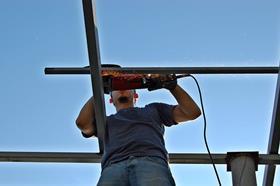The Health & Safety Executive’s drive to cut bureacracy could compromise safety, the Association for Project Safety warns

Maintaining the highest standards of health and safety in the construction industry is what keeps me and my colleagues at the Association for Project Safety motivated. I am sure the same is true of our partners at the Health and Safety Executive. We agree on that, but the proposed revision of the Construction, Design and Management Regulations may find us disagreeing on how that is best achieved.
Unnecessary paperwork is a bad thing. You won’t find many in the construction industry who would disagree. It does nothing to reduce safety and health risks on building sites, but does impose extra costs on everyone, from the client to the sub-contractors. That’s the last thing the industry needs right now as it struggles to regain its feet and help the economy grow.
Less experienced practitioners tend to generate more paperwork than necessary in an attempt to cover themselves for any eventuality
There is a government-wide effort to reduce bureaucracy through the BIS one-in-two-out initiative for new regulations. The proposed revision of the 2007 CDM Regulations, which are due out in draft from the HSE shortly, is likely to be portrayed by the HSE as their contribution towards this anti-bureaucracy initiative. But in practice the effect may well be the opposite.
The HSE is thought to be actively considering weakening the competency requirement for all dutyholders in the revised regulations. They might argue that this will reduce the amount of paperwork in the system, but my experience of nearly 30 years in the construction industry is that additional paperwork is actually generated in inverse proportion to the competence of the person. A competent designer, co-ordinator or contractor ensures that only necessary paperwork is generated. Less experienced practitioners tend to generate more paperwork than necessary in an attempt to cover themselves for any eventuality.
Placing the role of the design or construction phase health and safety co-ordinator with the lead designer is unlikely to reduce costs for the client or industry. Whoever undertakes this role will end up, in some way or another, charging the client for the work they do. It is likely that significant costs will be incurred by the construction industry in retraining practitioners and the preparation of new guidance to take account of the revised regulations.
The APS fully understands and supports the desire of government to reduce bureaucracy, the costs to business that comes with it and the need to ensure GB regulation meets with the requirement of the European Directive. We also share the desire to minimise the impact of regulation on the construction industry while maximising the effectiveness of compliance with current legislation.
With that in mind, we are concerned that, unless the requirements for competent, adequately resourced duty holders are retained, changes to the CDM Regulations could lead to reduced consumer and worker protection on construction projects by “freeing up” clients and others to take advantage or cut corners. This is particularly the case at the smaller end of the construction market where health and safety standards are already of great concern to the HSE and the industry.
Some of the key questions that the HSE will need to answer in regard to their proposals are:
- Do they simplify the regulations and improve their clarity so duty holders can easily identify and understand their responsibilities?
- Do they emphasise active management of design and construction risks and minimise bureaucracy?
- Do they strengthen the requirement for duty holder competence to help raise standards and reduce bureaucracy?
- Do they have sufficient flexibility to allow appointment of competent persons to act on behalf of dutyholders?
During the consultation period the APS will be hosting of a series of 15 open seminars across the UK to discuss the draft Regulations. We hope that many across the industry will join these debates so we can provide a fully informed and united response to the HSE.
James Ritchie is head of corporate affairs at the Association for Project Safety


























No comments yet